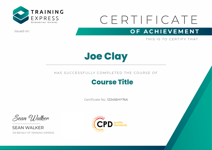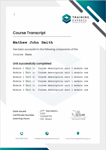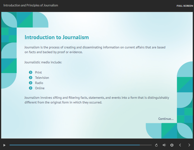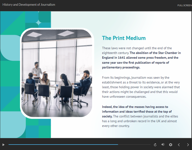
Journalism: Television & Radio Journalism
CPD Accredited | Free PDF & Hardcopy Certificate included | Free Retake Exam | Lifetime Access
Training Express Ltd
Summary
- Digital certificate - Free
- Hard copy certificate - Free
- Exam(s) / assessment(s) is included in price
- Tutor is available to students
Add to basket or enquire
Overview
In today's fast-paced world, Journalism plays a pivotal role in shaping public opinion and disseminating information. A Television & Radio Journalism course is essential for aspiring journalists, offering in-depth knowledge across diverse media platforms. With modules covering principles, history, and practical skills such as interviewing and news reporting, this course prepares individuals for the dynamic field of Journalism.
In the UK, the demand for skilled journalists is on the rise, with job opportunities increasing by 15% annually. The average salary for journalists in the UK stands at £30,000 per year, reflecting the industry's significance. With advancements in technology and the proliferation of digital media, the importance of this course cannot be overstated. Television and radio journalism, in particular, have seen a surge in popularity, with a 20% increase in viewership and listenership.
Enroll in this course to gain valuable insights into the ever-evolving world of Journalism and embark on a rewarding career in media.
Key Features of the Course :
- Instant e-certificate and hard copy dispatch by next working day
- Fully online, interactive course with audio voiceover
- Developed by qualified professionals in the field
- Self-paced learning and laptop, tablet, smartphone-friendly
- 24/7 Learning Assistance
- Discounts on bulk purchases
CPD
Course media
Resources
- Training Express Brochure - download
Description
Course Curriculum:
Journalism
- Module 01: Introduction and Principles of Journalism
- Module 02: History and Development of Journalism
- Module 03: Interviewing
- Module 04: Newspaper Journalism
- Module 05: News Writing, Production and Reporting
- Module 06: Television Journalism
- Module 07: Radio Journalism
- Module 08: Media Regulatory Bodies
- Module 09: Writing Skills for Journalists
- Module 10: Journalism law
- Module 11: Defamation
- Module 12: Journalism Ethics
- Module 13: Health and Safety for Journalists
- Module 14: Niche Journalism
- Module 15: Tips on Writing a Good Feature Story
- Module 16: Online and Freelance Journalism
- Module 17: Becoming a Journalist
Learning Outcomes:
- Understand foundational principles and history of journalism.
- Develop effective interviewing techniques for multimedia platforms.
- Master news writing and reporting skills for various media.
- Demonstrate proficiency in television and radio journalism production.
- Comprehend legal and ethical considerations in journalism practice.
- Acquire niche journalism expertise and freelance writing skills.
Accreditation
All of our courses, including this course, are fully accredited, providing you with up-to-date skills and knowledge and helping you to become more competent and effective in your chosen field.
Certification
Once you’ve successfully completed your Journalism: Television & Radio Journalism course, you will immediately be sent a digital certificate. Also, you can have your printed certificate delivered by post (shipping cost £3.99). Our certifications have no expiry dates, although we do recommend that you renew them every 12 months.
Assessment
At the end of the Journalism: Television & Radio Journalism course, there will be an online assessment, which you will need to pass to complete the course. Answers are marked instantly and automatically, allowing you to know straight away whether you have passed. If you haven’t, there’s no limit on the number of times you can take the final exam. All this is included in the one-time fee you paid for the course itself.
Who is this course for?
- Individuals aspiring to pursue a career in Journalism, especially in Television or Radio Journalism.
- Current Journalists looking to expand their knowledge and skills.
- Media professionals interested in understanding the mechanics of Journalism.
- Students of communication and media studies seeking a specialised focus in Journalism.
- Freelance writers aiming to diversify into Journalism.
Requirements
Learners do not require any prior qualifications to enrol on this Training Course. You just need to have an interest in this Course.
Career path
- Broadcast Journalist - £24K to 45K/year.
- Radio Producer - £25K to 50K/year.
- Multimedia Reporter - £22K to 40K/year.
- News Editor - £28K to 55K/year.
- Freelance Journalist - £18K to 60K/year.
Questions and answers
Currently there are no Q&As for this course. Be the first to ask a question.
Certificates
Digital certificate
Digital certificate - Included
Once you’ve successfully completed your course, you will immediately be sent a FREE digital certificate.
Hard copy certificate
Hard copy certificate - Included
Also, you can have your FREE printed certificate delivered by post (shipping cost £3.99 in the UK).
For all international addresses outside of the United Kingdom, the delivery fee for a hardcopy certificate will be only £10.
Our certifications have no expiry dates, although we do recommend that you renew them every 12 months.
Reviews
Currently there are no reviews for this course. Be the first to leave a review.
Legal information
This course is advertised on reed.co.uk by the Course Provider, whose terms and conditions apply. Purchases are made directly from the Course Provider, and as such, content and materials are supplied by the Course Provider directly. Reed is acting as agent and not reseller in relation to this course. Reed's only responsibility is to facilitate your payment for the course. It is your responsibility to review and agree to the Course Provider's terms and conditions and satisfy yourself as to the suitability of the course you intend to purchase. Reed will not have any responsibility for the content of the course and/or associated materials.








